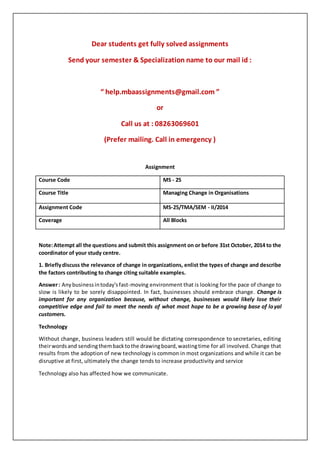
Get fully solved MBA assignments by email or call
- 1. Dear students get fully solved assignments Send your semester & Specialization name to our mail id : “ help.mbaassignments@gmail.com ” or Call us at : 08263069601 (Prefer mailing. Call in emergency ) Assignment Course Code MS - 25 Course Title Managing Change in Organisations Assignment Code MS-25/TMA/SEM - II/2014 Coverage All Blocks Note: Attempt all the questions and submit this assignment on or before 31st October, 2014 to the coordinator of your study centre. 1. Briefly discuss the relevance of change in organizations, enlist the types of change and describe the factors contributing to change citing suitable examples. Answer : Any business in today's fast-moving environment that is looking for the pace of change to slow is likely to be sorely disappointed. In fact, businesses should embrace change. Change is important for any organization because, without change, businesses would likely lose their competitive edge and fail to meet the needs of what most hope to be a growing base of loyal customers. Technology Without change, business leaders still would be dictating correspondence to secretaries, editing their words and sending them back to the drawing board, wasting time for all involved. Change that results from the adoption of new technology is common in most organizations and while it can be disruptive at first, ultimately the change tends to increase productivity and service Technology also has affected how we communicate.
- 2. 2. Discuss the concept of ‘process-based change’. Cite organizational examples where process based change has taken place successfully. Answer : Process-based organizational change has attracted considerable attention in recent decades, with the rise of total quality management (TQM) being followed by the emergence of business process reengineering (BPR). Since contextual factors can influence both the adoption and results of these process-based change initiatives, their international popularity has created an imperative to move beyond a culture-bounded perspective. The stark philosophical, economic and historical differences between Americans and the Chinese make the comparison of process -based organizational change in these two societal contexts 3. Describe the approaches and methods of evaluating change. Illustrate few examples of evaluation of organizational change. Answer : Evaluation typically is the last consideration in planning and implementing an intervention. However it is critical that evaluation be planned from the start so necessary data or information is identified and collected. Before beginning the intervention, baseline data or information must be collected for the intended outcomes. The intended outcomes of your intervention were identified when preparing the intervention goals, objectives, outcomes and a logic model (see Readiness and Preparation). Information and data that were collected when conducting your needs assessment (see Assessment) may provide some or all of the baseline 4. Explain the concept of organizational diagnosis. Describe any two methods of diagnosis and its benefits and limitations with the help of examples. Answer : Organizational diagnosis is a process based upon behavioral science theory for publicly entering a human system, collecting valid data about human experiences with that system, and feeding that information back to the system to promote increased understanding of the system by its members (Alderfer, 1981). Purpose of organizational diagnosis is to establish a widely shared understanding of a system and based upon that understanding to determine whether change is desirable. What is organisational diagnosis? Describe the steps and methods of organisational analysis. Discuss the process of organisational analysis with 5. Write an essay on ‘managing transitions’. Differentiate it from ‘managing change’. Take a hypothetical organization and apply the rules for managing transition. Answer : “managing transitions” was authored by William Bridges. William Bridges was an American author, speaker, and organizational consultant. He emphasized the importance of understanding transitions as a key for organizations to succeed in making changes. He says that transition the psychological process of adapting to change. Transition consists of three phases; letting go of the past, the "neutral zone" where the past is gone but the new isn't fully present, and making the new beginning. One of the ‘classic’ texts on Change Management is
- 3. Dear students get fully solved assignments Send your semester & Specialization name to our mail id : “ help.mbaassignments@gmail.com ” or Call us at : 08263069601 (Prefer mailing. Call in emergency )
